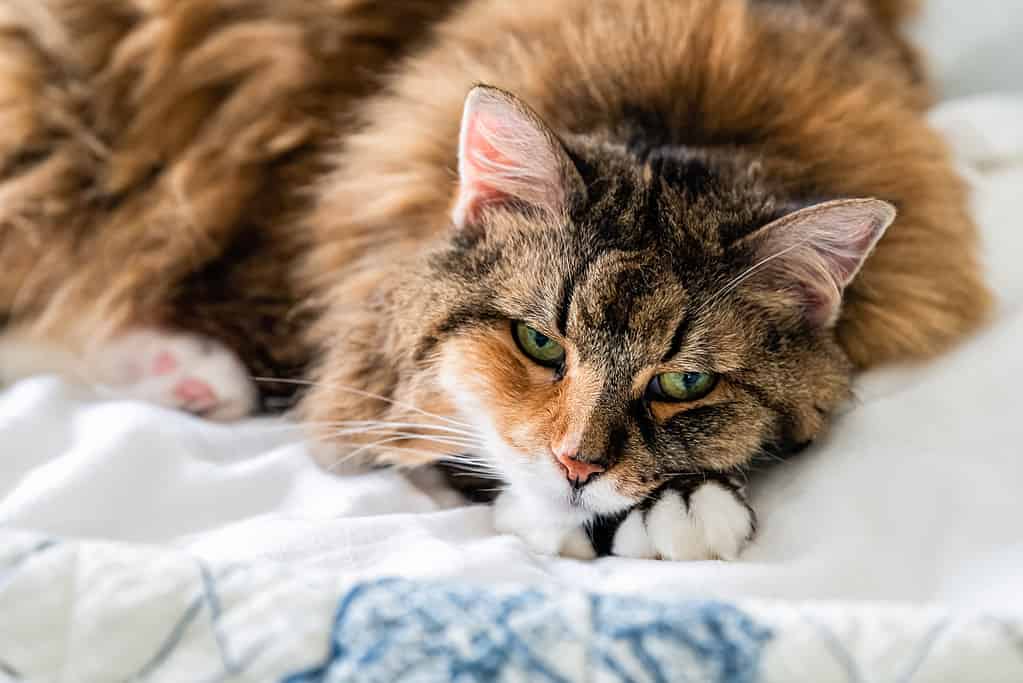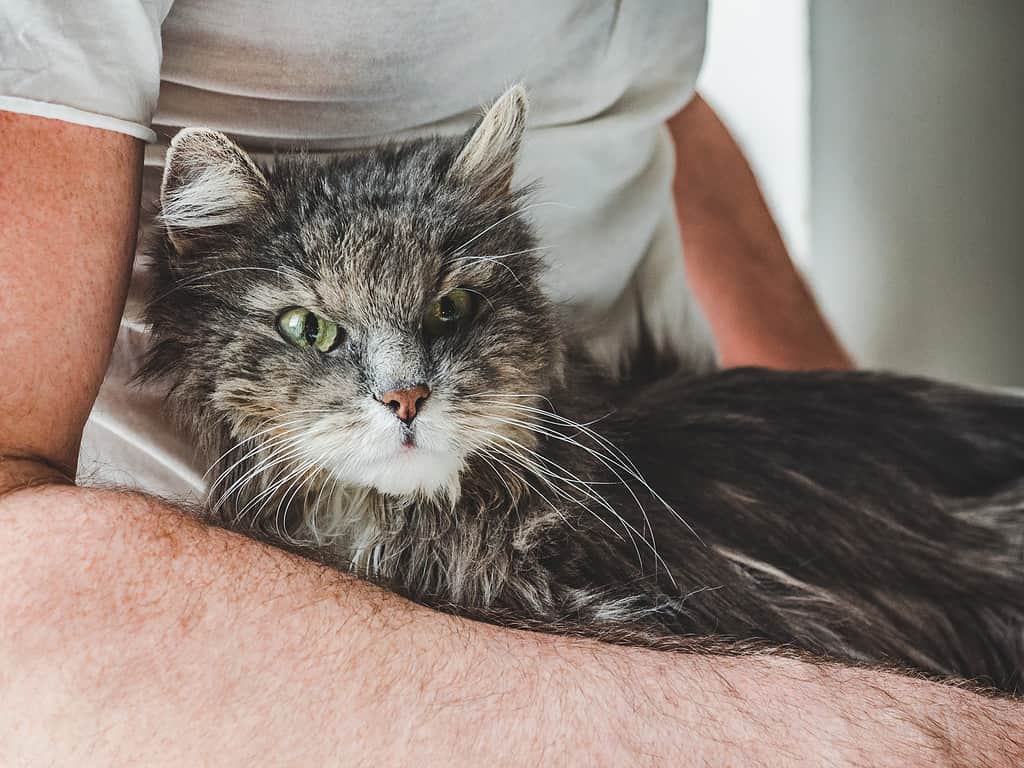Cat parents love snuggling with their little furballs. But what happens if the snuggling never ends? A clingy cat might overwhelm you with affection, following you from room to room and meowing loudly when you leave.
The clingy behavior is often very charming, but it can also be disruptive or even a sign that something’s wrong with your cat’s health.
It’s important to figure out what’s going on. Cats can become too clingy for various reasons, including changes in their environment, anxiety, and medical issues.
In this article, we’ll break down how to spot a clingy cat and explain what you can do to stop the behavior.
Signs Your Cat Is Too Clingy
You’re the most exciting person in your cat’s world; of course, they want to hang out with you! A happy lap cat might spend hours draped over your shoulders or trotting at your side.
So, how can you tell if your cat is too clingy? Here’s what to look for:
- They’re distressed when you leave, engaging in behaviors like meowing excessively or refusing to use the litter box.
- You always know where they are when you’re at home — right next to you.
- They constantly meow for attention.
- Vacations are difficult because the cat refuses to eat when you’re not around.
- They sleep next to you and show anxiety when moved.

Cats can act clingy when they’re bored.
©krblokhin/iStock via Getty Images
Why Cats Act Clingy
Your clingy cat may be very overwhelming at times, especially if they meow often. Knowing why your feline friend is so needy might help you curb the behavior.
Now, let’s talk about possible reasons for cat clinginess.
Premature Separation
Kittens need a lot of time with their mom to develop into confident, friendly cats.
According to a 2023 study published in Applied Animal Behaviour Science, separating kittens from their mothers too early can lead to noticeable changes in stress responses. The “orphaned” kittens in the study showed signs of separation anxiety.
Kittens are generally ready to eat solid food after eight weeks; however, many experts say you should wait a few more weeks before bringing the kitten home. The extra time with their mother and littermates provides valuable socialization.
Separation Anxiety
Separation anxiety can arise from leaving mom too soon, but that’s not the only cause. Some cats are naturally anxious and need their owners around to feel comfortable.
Mild separation anxiety might see your cat pawing at you when you leave for work or perhaps scratching at the door when you go to the bathroom. A more extreme kitty might yowl incessantly.
Boredom
Cats are active, inquisitive creatures. They need mental and physical stimulation to stay happy. If there’s nothing else to do, sticking to you like velcro suddenly makes sense. You provide entertainment.
Fortunately, this problem is easy to take care of, and you don’t need any money. Give your cat toys and puzzles to play with. Toys can be anything from a mouse-shaped plushie from the pet store to a ripped shoebox in your closet.

A clingy cat might meow loudly until you let it sit on your lap.
©Sviatlana Barchan/iStock via Getty Images
Health Problems
Certain cat health issues can manifest as clingy behavior. For example, cats with cerebellar hypoplasia (CH) are often described as very cuddly.
Your cat may also try to be closer to you if they’re in pain. Some cats prefer to suffer quietly, but others find comfort in companionship. Taking your cat to the vet will help you diagnose what’s happening.
Old Age
Clinginess often develops as cats age. Their confidence slips as their bodies and minds become less reliable.
Cognitive declines lead to disorientation, so your cat doesn’t always know where they are. Your presence can gound them. Or, your cat may struggle to move around and need your help. You can’t turn your cat into a kitten again, but you might be able to tame the most annoying behavior.
For instance, does your cat cling to you when you’re trying to work? Put a cat bed on or near your desk.
Changes in Environment
Did you recently upgrade your couch or dining room table? Or move to a different home? Cats thrive on routine, so any big changes to their environment can stress them out.
Your cat should adapt to their new surroundings eventually, but it might take a little time, especially if they’re older or naturally timid. In this case, being patient and loving is likely all you need to do to help.
Try not to yell at your cat, as the stress can make them even more unsure of their environment.
Breed
In pop culture, cats are usually depicted as fiercely independent loners. However, this couldn’t be further from the truth for some breeds.
Siamese cats, for instance, are very vocal and usually do not like being alone. Abyssinians aren’t as vocal but maybe even more demanding. These intelligent cats need continual stimulation.
Additional clingy cat cat breeds include Persian, Ragdoll, Sphynx, and Burmese.
Someone in the House Is Pregnant
Strangely, cats seem to sense when someone’s pregnant. It’s not uncommon for cats to spend all their time near the growing belly.
The extra affection can be a boon during an emotional period.

A kitten lovingly taps its owner’s nose.
©Raphael Angeli/iStock via Getty Images
How to Help a Clingy Cat
Once your kitty’s behavior becomes a problem, it’s time to think about solutions. You have many options:
- Set boundaries. Love and cuddle your cat, but don’t respond to insistent or aggressive meowing. Doing so teaches that you’ll give in to their demands.
- Play. Burn extra energy through games and fun so your cat is less likely to be bored.
- Adopt a playmate: A clingy cat wants more attention than you can provide. Adopting another furry friend can keep your cat entertained.
- Create a safe space: Give them a space entirely for cats, whether it’s a cat condo, a soft bed, or a particular corner of the living room.
If nothing works, speak with a vet. The vet can determine if the cat needs medication.
Ultimately, reducing your cat’s clinginess can help them live healthier and happier lives.
The photo featured at the top of this post is © asadykov/iStock via Getty Images
Thank you for reading! Have some feedback for us? Contact the AZ Animals editorial team.






